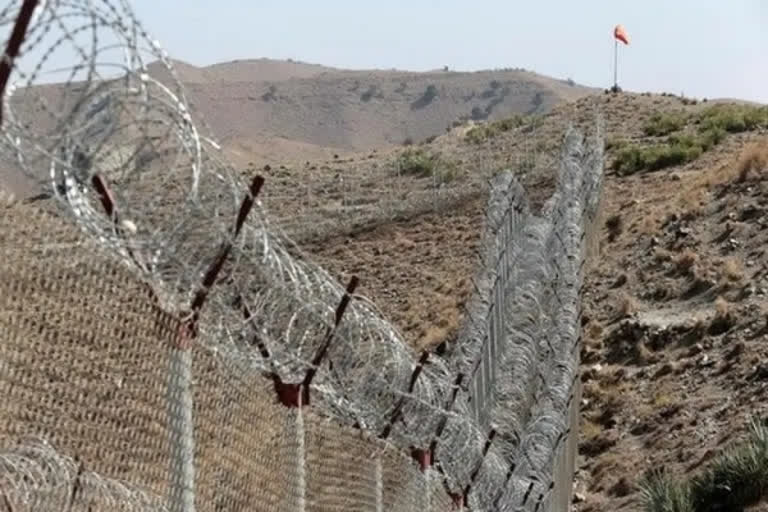New Delhi: With the arrival of New Year, one thing that would certainly remain consistent is New Delhi's relations with Pakistan. With the fall of the Afghan government and the subsequent rise of the Taliban 2.0, the conundrum between New Delhi and Pakistan over Afghanistan would remain a matter of concern.
While speaking to ETV Bharat, several experts underscored that it is unlikely that the relationship between Islamabad and New Delhi over Kabul and other issues including terrorism and Jammu and Kashmir would alter given the kind of hostility and terror measures used by Pakistan to create instability via terrorism and extremism.
The latest developments in the South Asia region have given rise to fresh troubles for Pakistan as clashes erupted between Pakistani forces and Taliban fighters at the Durand Line.
Durand Line is a 2,670-kilometre international land border between Afghanistan and Pakistan, but Taliban do not accept the Durand line and therefore it will continue to destroy the barbed wires at the border. Though Pakistan is facing continuous border tensions at the Durand line, the country continues to support and harbour terror outfits in their region to use it against Jammu and Kashmir for creating instability and terror.
READ: Pakistan, Taliban resolve border fencing row after talks
Dr. Swaran Singh, professor for diplomacy and disarmament at Centre for International Politics, Organisation and Disarmament (CIPOD), School of International Studies, Jawaharlal Nehru University, said that the constant hostilities between Pakistan and Afghanistan cannot be in the interest of India's national security.
"Right now, it could be a problem between Pakistan and Taliban. But India has to really be aware that tensions in the region will be negative for India's national security interests," Singh said.
He added that the revival of the Taliban nearly after 20 years was a victory for Pakistan, but it failed to deliver what it had promised to the Taliban's central leadership and that was to get international legitimacy.
As New Delhi is witnessing a spike of attacks in the Kashmir valley by insurgent groups - backed by Islamabad ever since the Taliban came into power - one crucial aspect remains unresolved that would the security apparatus be affected by the Taliban take over.
MEA spokesperson Arindam Bagchi, in a virtual media briefing, on Thursday highlighted that "there has been no consensus that will permit the holding of the SAARC summit".
This development comes days after Pakistan invited India for the SAARC summit and urged that if it could not attend it in physical presence due to Covid threats, it could do so via virtual mode. But New Delhi's reply underscores the kind of relationship the two states enjoy.
The statement by MEA also highlighted that Pakistan continues to support cross border terror, hosted Osama bin Laden, and has a notorious track record of human rights violations.
READ: Pakistan invites Taliban to attend OIC summit on December 19
Referring to the hostilities between Taliban and Islamabad, Prof. Harsh V. Pant, director of Studies and Head of Strategic Studies Programme at Observer Research Foundation in New Delhi, said, "If India is a bit shrewd, it can use it to its own advantage because this is an opening now and it had been clear that whoever controls Afghanistan would eventually come into conflict with Pakistan.''
While India has been sending humanitarian support to Afghanistan without recognising the Taliban regime, one thing that remained significant was Pakistan's reluctance to allow that aid to reach Afghanistan via the Wagha border, a deliberate attempt to tarnish the image of New Delhi.
Dr. Swaran Singh added that after New Delhi altered the status of J&K by dividing it into two Union Territories, Pakistan and China remained on a hostile stand and took the matter to the UN. But it's a success for New Delhi that it continued to thwart any aggressive and antagonistic stand. "So managing the backlash from Pakistan and China showcases that India has done well in that sense."
When asked about possibility of New Delhi engaging directly with Taliban, Prof Swaran Singh said, "I don't think that India would look at engaging with the Taliban as a way to punish or alienate Pakistan. Pakistan is integral to the Taliban in command in Kabul. Every nation has its own strategic and national interests and that's why New Delhi is keen to provide humanitarian assistance to the war-torn region."
With the collapse of the Kabul economy as winters hit the ravaged nation, one thing remained significant and that was the dominating footprints of Pakistan into the affairs of Afghanistan.
READ: India, Pak struggling to reach consensus on providing humanitarian assistance to Afghanistan: Report
The initial euphoria of the Taliban getting support from Pakistan and China has largely panned out. At present, the Taliban has lots of resources to deal with. So clearly, they also want outreach to India and other countries. And given their complicated relationship with Pakistan, they would also like some sort of balancing role for India there, said Prof Harsh Pant.
While the threat perception for New Delhi has eventually accelerated since August 15, one thing that has rather become crystal clear is that Pakistan's foreign policy towards India is unlikely to alter given their dubious stands and strategic interests.



